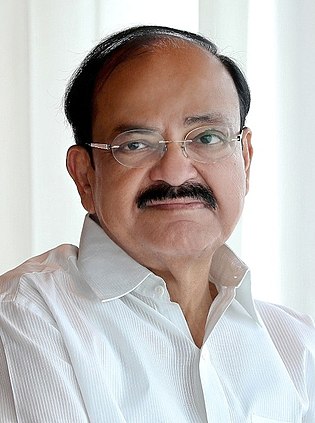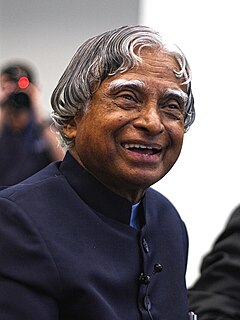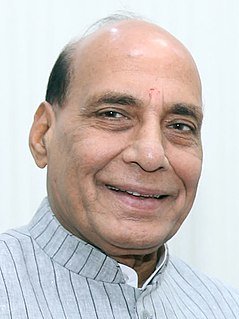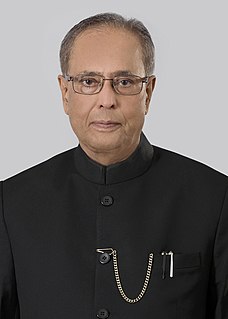
Lal Krishna Advani is an Indian politician who served as the 7th Deputy Prime Minister of India from 2002 to 2004 under Atal Bihari Vajpayee. He is one of the co-founders and a senior leader of the Bharatiya Janata Party. Advani also served as Minister of Home Affairs in the BJP-led National Democratic Alliance government from 1998 to 2004. He was the Leader of the Opposition in the 10th Lok Sabha and 14th Lok Sabha. He was the National Democratic Alliance prime ministerial candidate in the 2009 general elections.
The National Democratic Alliance (NDA) is a coalition of Progressive centre-right to right-wing political parties in India. At the time of its formation in 1998, it was led by the Bharatiya Janata Party (BJP) and had 13 constituent parties. Its chairman was late Prime Minister Atal Bihari Vajpayee. Also representing the alliance are L. K. Advani, former Deputy Prime Minister, who is the acting chairman of the Alliance, Narendra Modi, current Prime Minister and the Leader of the House in Lok Sabha; and Arun Jaitley, Leader of the House in Rajya Sabha and Finance minister. The coalition ruled from 1998 to 2004. The alliance returned to power in the 2014 General election with a combined vote share of 38.5%. Its leader, Narendra Modi, was sworn in as Prime Minister of India on 26 May 2014.

Sushilkumar Sambhajirao Shinde is an Indian politician from the state of Maharashtra. He was the Minister of Home Affairs, Minister of Power in the Manmohan Singh government, and the Leader of the House in Lok Sabha until 26 May 2014. He previously served as the Chief Minister of the state of Maharashtra during 18 January 2003 to October 2004.

Jaswant Singh is a retired officer of the Indian Army and a former cabinet minister. He is a founding member of the Bharatiya Janata Party. He is one of India's longest serving parliamentarians, having been a member of one or the other house almost continuously between 1980 and 2014. he was elected on a BJP ticket to the Rajya Sabha five times and to the Lok Sabha four times. During the Vajpayee administration (1998-2004), he held some of the highest offices of the land, handling at various times the cabinet portfolios of Finance, External Affairs and Defence. He also served for a period as Deputy Chairman of the Planning Commission (1998–99). In the aftermath of India's nuclear tests of 1998, he was deputed by Prime Minister Vajpayee to act as India's single representative to hold repeated, long-term dialogue with the USA on matters related to nuclear policy and strategy; the outcome of the sustained engagement was positive for both countries. After his party lost power in 2004, Jaswant Singh served as Leader of Opposition in the Rajya Sabha from 2004 to 2009.
Annasaheb M. K. Patil is an Indian politician with the Bharatiya Janata Party (BJP). He was a member of parliament in the 14th Lok Sabha of India, representing the Erandol constituency of Maharashtra,. In the National Democratic Alliance (NDA) government (1999–2004), he was Minister of State for Rural Development.

India held general elections to the 15th Lok Sabha in five phases between 16 April 2009 and 13 May 2009. With an electorate of 714 million, it was the largest democratic election in the world till the Indian General Elections 2014 held from 7 April 2014.
The Vishram Patil murder case gained national attention in India when the widow of the murder victim accused Pratibha Patil, the presidential nominee of the United Progressive Alliance, of shielding her brother, G. N. Patil, in relation to it.
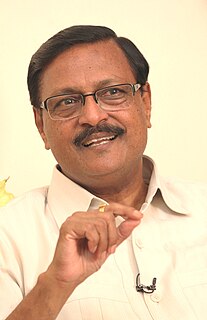
Satya Pal Jain is the Additional Solicitor General of India & Member of the Law Commission of India. He is a Member of Bharatiya Janata Party (BJP) National Executive Committee. He was elected Member of Parliament from Chandigarh in 1996 and 1998. He is a practising Senior Advocate in the Supreme Court of India and the Punjab and Haryana High Court at Chandigarh.
Members of the 15th Lok Sabha were elected during the 2009 general election in India. It was dissolved on 18 May 2014 by President Pranab Mukherjee.

The 14th indirect presidential election, in order to elect the 13th president, was held in India on 19 July 2012. The last date for filing nominations was 30 June, whereas the votes would be counted on 22 July. The two leading candidates for the presidency were former Finance Minister Pranab Mukherjee from West Bengal and former Speaker of the Lok Sabha Purno Agitok Sangma from Meghalaya.
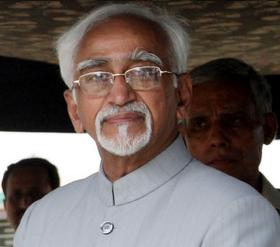
The 2012 Indian Vice-Presidential election was held on 7 August 2012 to elect Vice-President of India. Mohammad Hamid Ansari was the incumbent and the UPA candidate. The other prime candidate was the NDA's Jaswant Singh.

The Bharatiya Janata Party (BJP) is one of the two major political parties in India and was the main opposition party during the 15th Lok Sabha. It contested the 2014 parliamentary election as the leading party of the National Democratic Alliance with Narendra Modi as its Prime Ministerial candidate and party president Rajnath Singh as the chief-of-election of campaign. The important issues during the campaign included price hike, corruption, economy, security, infrastructure such as roads, electricity and water. The party promised a vibrant and participatory democracy, inclusive and sustainable development, quality life, productive youth, globally competitive economy, open and transparent government, pro-active and pro-people good governance in its manifesto.

The 2007 Indian vice-presidential election was held on 10 August 2007 to elect Vice-President of India to serve from 2007 until 2012. Mohammad Hamid Ansari from Indian National Congress was elected for the post. The incumbent, Bhairon Singh Shekhawat did not seek reelection and instead ran for President in 2007 election, where he lost to Pratibha Patil. He subsequently resigned from VP post days before Patil's inauguration.

The First Lady or First Gentleman of India is the unofficial title and position traditionally held by the wife or husband of the President of India during that person's term of office. There are no official roles or duties assigned to the spouse but he or she generally attends the official ceremonies and functions held at the Rashtrapati Bhavan along with the President.

A presidential election was held in India on 17 July 2017 with the votes counted and the results announced on 20 July 2017. Ram Nath Kovind became 14th President of India. President Pranab Mukherjee, whose term of office was due to expire on 24 July 2017, declined to seek re-election due to health concerns and old age.
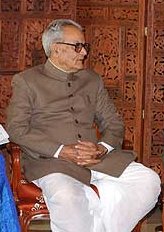
The 2002 Indian vice-presidential election was held on 12 August 2002 to elect the newly-vacated post of Vice-President of India. Bhairon Singh Shekhawat defeated Sushil Kumar Shinde to become 11th Vice President of India. Incumbent VP Krishan Kant did not contest the election and died before the election occurred.








